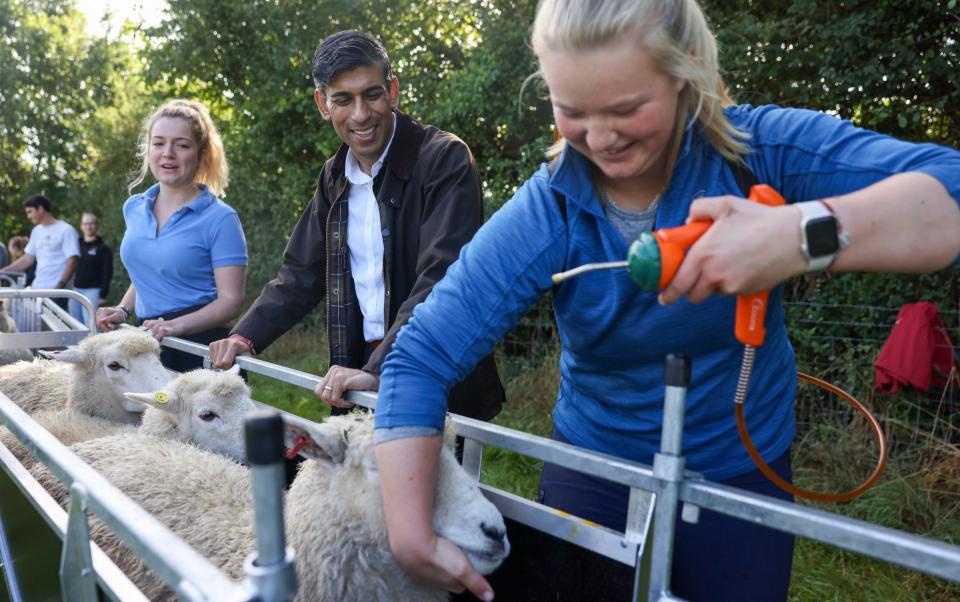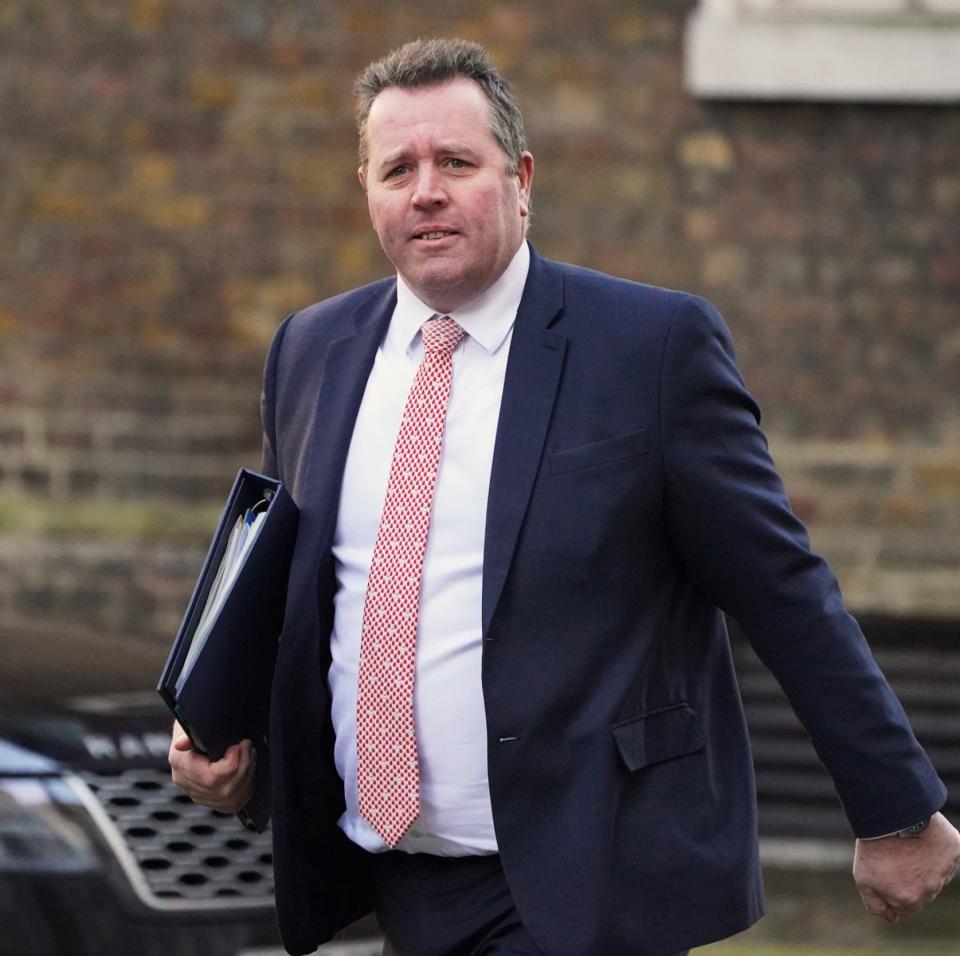Rishi Sunak will today announce funding to help British farmers reduce their dependence on foreign workers and says their vital contribution to the British way of life must be protected.
Speaking at the National Farmers Union [NFU] At the conference the Prime Minister will tell farmers the government will “stand by them” as he unveils a spending package worth almost half a billion pounds in the form of farm grants.
Government ministers have been inspired by the innovative use of automation in agriculture, such as robots that can uproot asparagus and even the possibility of picking fruit with drones.
Around £220 million of funding will be directed towards future-focused technology, including equipment that increases automation to reduce reliance on overseas workers.
In his speech, Mr Sunak will tell an audience of farmers that he understands how important they are and that he will not take food security for granted.
In his opening speech at the annual conference, the Prime Minister will also tell farmers that the vital contribution they make to the British way of life must be protected for years to come.


The address reflects signs that Labor is making headway with its traditional Conservative support base in the countryside; some polls put the Conservative Party behind rural voters.
In recent years it has been unusual for a prime minister to speak personally at an NFU conference; environment ministers were making more such opening speeches.
Mr Sunak will say: “Farming is undergoing the biggest change in a generation, although the importance of the farmer will never change. While farmers do this, this government will stand by them.
“They are dealing with rapidly increasing global prices for things like fuel and fertilizer. That’s why we’re working hard to reduce inflation from 11.1 percent last year to 4 percent now. And we’re increasing payouts on our farming plans by an average of 10 percent.
“They are also at the forefront of innovation, from gene editing to improving disease resistance to automation to help harvest crops. And while we can enjoy quality food all year round, thanks to you, global events, including Russia’s invasion of Ukraine, have put food safety back at the top of the agenda. We will never take our food security for granted. “We have a plan to support British farming and today we are going further again.”


He adds: “I know how important my neighbors, our farmers, really are. “You help employ millions, you add billions of dollars to our economy, you shape nature, but most of all, you produce the food we need, the best and highest quality food anywhere in the world.”
The Prime Minister’s speech coincided with an announcement on how £427 million of government money in the form of farming grants will be shared.
Around £220 million of this will focus on improving efficiency through technology and innovation, including areas such as robotics, automation and solar power.
Projects that have impressed ministers recently include a four-legged robot trained to cut and pick asparagus from the ground.
A press release issued by the Ministry of Environment listed “kits that increase automation to reduce dependence on workers abroad” as one of the areas that could receive funding.
How many foreign workers will be allowed into the UK to do agricultural work has been debated in Westminster for years, and a seasonal worker visa scheme is also in the works.


Writing for The Telegraph, agriculture secretary Mark Spencer blasts Labor, saying: “Labour has fought tooth and nail to keep us in the European Union and our farmers are routinely fined thousands of pounds. high.
“They have already shown that leaving responsibility for farming policy will take us right back to square one. They have failed to protect farmers from the devastating effects of Bovine Tuberculosis and have failed to protect Welsh farmers and communities from flooding. “They have no plans to protect farming or food security and have repeatedly refused to ignore meat taxes.”
But Labour’s shadow environment secretary, Steve Reed, responded by saying: “This Conservative government has undermined British farming. They have imposed trade barriers that hinder food exports, causing energy bills to spiral out of control, crippling manufacturers and putting thousands of people out of work.
“The workforce will give farmers their future back. “We will remove export barriers by signing a veterinary agreement with the EU, boost jobs by buying more local food for hospitals and prisons, and cut energy bills by producing clean energy here in the UK.”
Conservative government will always support farmers
I am a farmer and when I look back I realize how much farming has changed in the last few years. Higher population, more extreme weather events, new technology and a complete reset of the way farming is supported after we leave the European Union. It was a very turbulent period but one that created great opportunities. We can and should look to the future with optimism.
This is a government that will always support our farmers. We don’t want to tell farmers what to do, but we support them to do what they think is right for their business. We also want to support them in fulfilling what is ultimately their primary role; produce food. We are incredibly lucky to have good food security in this country, thanks to our farmers. But global events have reminded us that we should not take this for granted.
So I look at what is happening to farmers in Wales with both despair and concern. Successful domestic production is what gives us national resilience in an uncertain world. Global events, including Putin’s illegal war in Ukraine, have once again demonstrated how important domestic food security is. But the Labor government in Wales has opted to introduce targets from next year that will force farmers to cover at least 10 per cent of their land with trees and another 10 per cent with habitat to access vital funding.
Labor has no food security plan
This shows that Welsh Labor has no plan for food security, nor does it care about the stability of agricultural businesses or the wider supply chain. Stakeholders rightly questioned whether the Welsh government would expect any other sector to take action that would reduce the value of an asset – in this case productive farmland – by up to 80 per cent.
We should not underestimate the impact this has had on Welsh farmers or the strength of the sentiment it has created. Last week, a mock coffin featured a rally raging against Welsh Labour’s reforms; farmers feared this could represent the death of Welsh farming. Nearly 3,000 people attended the event in Carmarthen and another 1,000 demonstrated in Welshpool. But Welsh Labor refuses to listen.
One of the biggest advantages of leaving the Common Agricultural Policy is that we can develop a suitable support system for our farmers. A big part of this is the changing relationship between farmers and the Government. At this week’s NFU Conference the Prime Minister, a great friend of farming, outlines how the Government will work with farmers in England going forward. Simply put, here in the UK we will trust our farmers to stay in business and do what we can to help them; whether it’s support for investing in new technology or removing the planning red tape that keeps them from diversifying.
Crops require less pesticide
More than that, we will do what the Welsh Labor Government has so epically failed to do. We will further support and increase domestic food security by placing the publication of the Annual Food Security Index on a legal basis. We expect this to happen across the UK and strengthen accountability in England, Wales, Scotland and Northern Ireland. We are also accelerating measures to improve fairness in supply chains, including in the dairy and pork sectors, and increasing investments in automation and productivity.
Meanwhile, we have already introduced precision breeding legislation that will help us develop crops that require less pesticides, can better withstand periods of extreme rainfall or drought, and are more resistant to diseases. Naturally, the Welsh Labor government chose not to follow in our footsteps and farmers across Wales were deprived of the chance to produce more resilient crops.
In England, we’ve given farmers more money and more choice through our new farming schemes. Following the severe weather conditions we experienced at the beginning of this year, we reacted quickly to establish the Agriculture Recovery Fund. We have introduced fully funded annual vet visits on farms and provided over £120 million in grant funding to farmers through the Farming Investment Fund.
Labor connected us to the EU
Labor fought tooth and nail to keep us bound to the European Union; fines worth thousands of pounds were routinely levied on our farmers. They have already shown that when they relinquish responsibility for farming policy, they will take us back to square one. They have failed to protect farmers from the devastating effects of Bovine Tuberculosis and have failed to protect Welsh farmers and communities from flooding. They have no plans to protect farming or food security and have repeatedly refused to ignore meat taxes.
I know the move away from the Common Agricultural Policy has had its ups and downs at times, but here in the UK we are moving in the right direction. We have an opportunity to have a more independent and financially resilient agricultural sector. If we stick to the plan, we will improve soil health and water quality while increasing our food security and inspiring the participation of a new generation of farmers. The rest of the world will look to us as an example of how to do this better.
I regret that the same cannot be said for Wales; The farmers, ranchers and rural communities there deserve much better.
Agriculture Minister Mark Spencer, Conservative MP for Sherwood